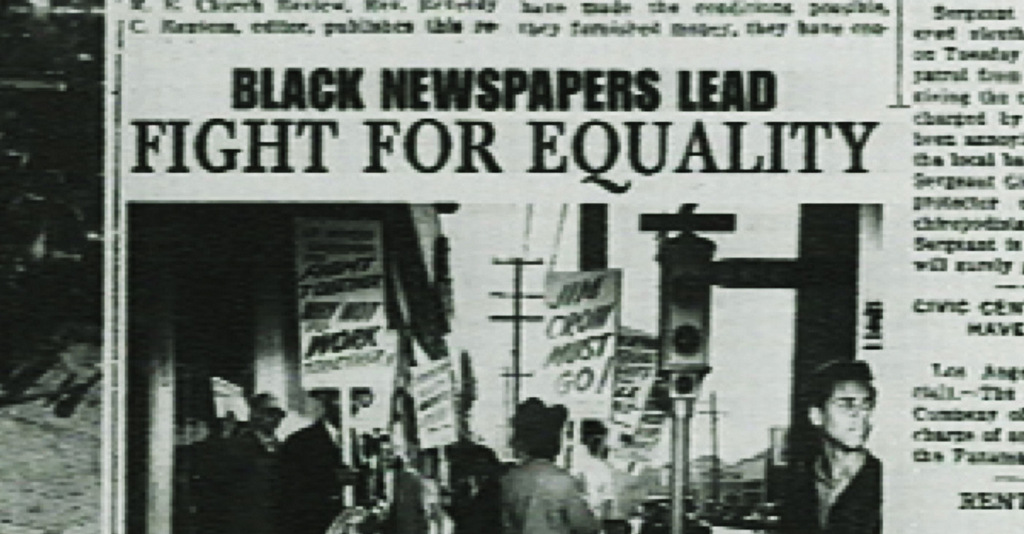[ad_1]
By Stacy M. Brown, NNPA Newswire Correspondent, @StacyBrownMedia
Frederick Douglass, W.E.B. DuBois, Ida B. Wells Barnett, Langston Hughes, Romare Bearden, James Weldon Johnson, Mary McLeod Bethune, and Daisy Bates are all names that are notable in many ways.
But, their contributions to the Black Press remain profound.
It’s the talent and fearlessness of such editors, publishers, journalists, cartoonists and contributors that have allowed the Black Press to survive and thrive regardless of many obstacles.

Today, the names of others including Bob Bogle, Dorothy Leavell, Danny Bakewell, Sr., Rod Doss, Rosetta Miller Perry and John Oliver – continue to carry forward the Black Press banner.
In a white paper posted on the website of the University of Illinois at Chicago, Dr. Jane Rhodes, the head of the department of African American studies said the Black Press [remains] a critical aspect of African American history and culture.
Rhodes likened the importance of the Black Press to churches, political and service organizations, and schools and universities.
“The Black Press has been central to community formation, protest, and advocacy, education and literacy, and economic self-sufficiency,” Rhodes wrote.
Importantly, Rhodes noted that the Black Press “did not always follow the transformation of the mainstream press from a strictly partisan institution to a mass medium governed by ideals of objectivity.”
“African American journalism has played a dual role, serving as purveyors of news and information and as agents of social change,” Rhodes said, noting that the Black Press has always been a source of Black American political power.
Journalist Vernon Jarrett once wrote about the importance of the Black Press to African Americans: “We didn’t exist in the early papers. We were never born, we didn’t get married, we didn’t die. We didn’t fight in any wars. We never participated in anything of scientific achievement. We were truly invisible, unless we committed a crime.”
“But, in the Black Press, the Negro press, we did get married,” Jarrett said.
“They showed us our babies being born. They showed our graduations. They showed our Ph.D.’s.”
In a feature by the California Newsreel titled, “The Black Press: Soldiers without Swords,” several journalists noted the history of the Black Press and they highlighted a period in the late 1940s and early 1950s when Black newspapers helped lay the groundwork for the Civil Rights movement.
The feature film’s narrators said the greatest achievements of the Black Press during that time were its “uncompromising political activism, increasing visibility, and recognition of its journalistic excellence.”
“Black newspapers muted their militancy to fend off accusations of Communism, and to appease big advertisers who had finally become interested in attracting Black consumers,” the journalists noted.
At the same time, the mainstream press began to integrate its staffs, and hired some of the best African American reporters away from Black newspapers.
As the Civil Rights movement developed, the Black Press covered breaking events across the country. Black newspapers sent reporters into whites-only lunch counters, to write about their experiences of being harassed and refused service.
They covered demonstrations, riots, and speeches by leaders such as Dr. Martin Luther King, Jr.
Honoring that history continues today.
With its annual convention in Cincinnati this year, the National Newspaper Publishers Association again gathers with its past and future in mind.
The convention provides an opportunity for publishers of the Black Press to plot a course that helps African-American-owned newspapers to continue the mission of its forefathers.
“It gives us an opportunity to meet and convene to talk about issues that we normally don’t have the time to sit and discuss,” said Cloves Campbell, publisher of the Arizona Informant.
“It’s an opportunity for us to learn about some of the trends and things that are happening in the world, and how we can continue to motivate,” Campbell said.
Denise Rolark Barnes, publisher of the Washington Informer, said the importance of the role Black Press has in the community can never be overstated.
“We have the responsibility to uplift the Black community and we take that role seriously,” Rolark Barnes said.
“We try and find ways to get our message out and to articulate what our community’s needs are and how we are actually working to serve those needs,” she said. “I think the number role we have is to keep our community informed, educated and inspired.”
[ad_2]
Source link
